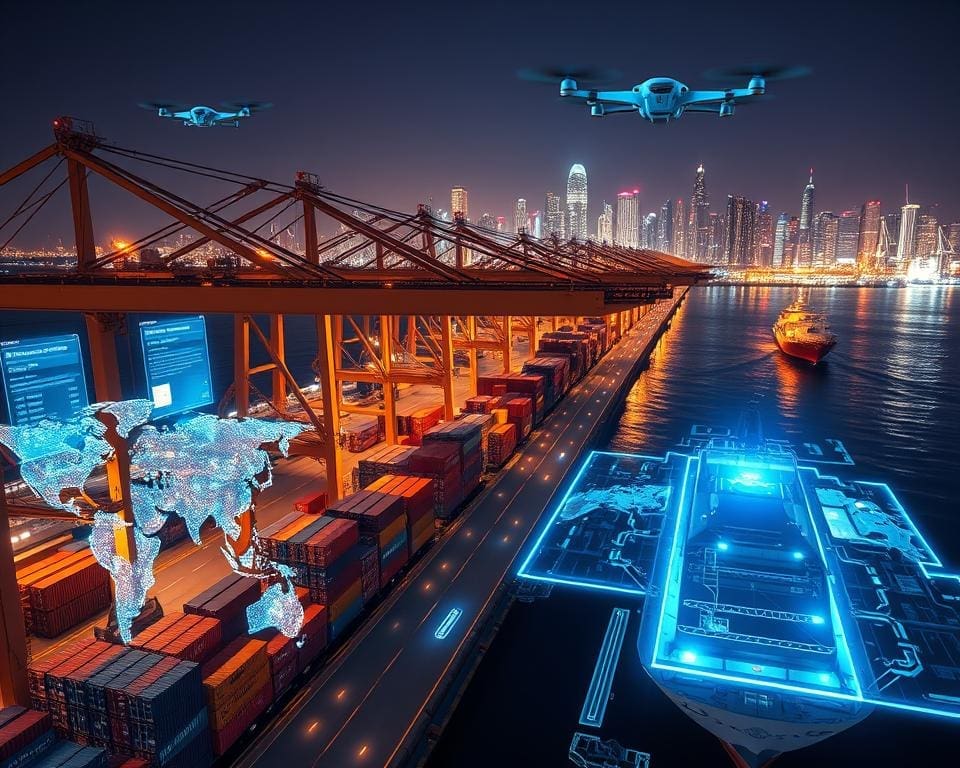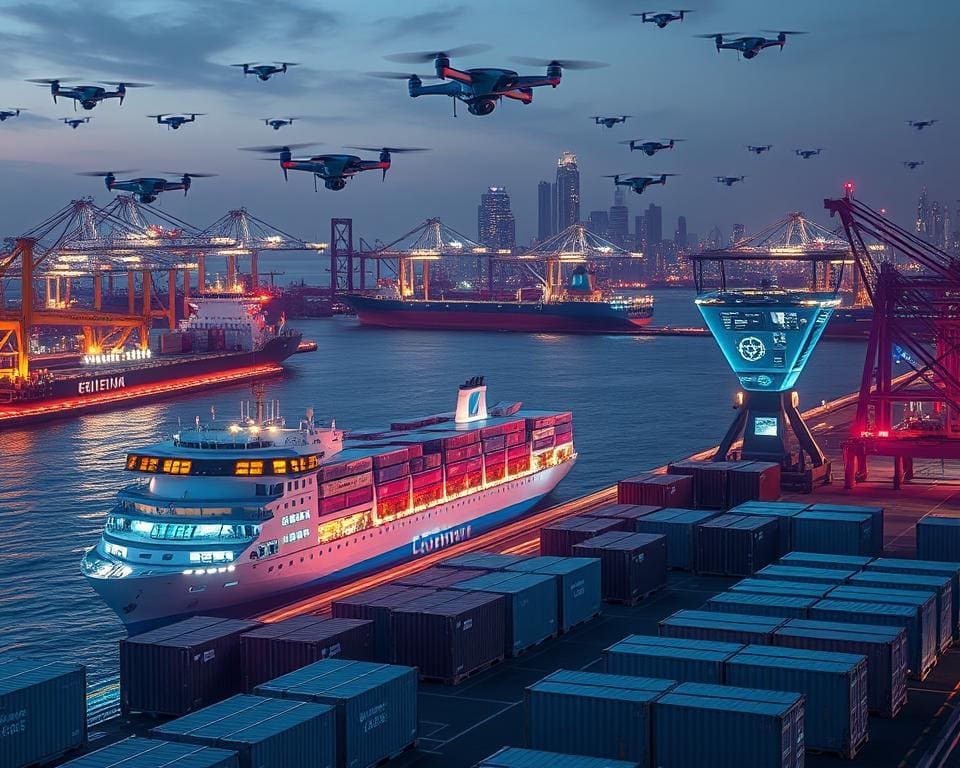In an era dominated by rapid technological advancements, the maritime industry is undergoing a significant transformation through the rise of digital shipping tech. With an integrated approach to shipping innovation, smart ports are emerging as critical players in enhancing operations and redefining maritime logistics. These cutting-edge facilities leverage advanced technologies to optimise efficiencies, streamline processes, and contribute to sustainability. As we delve deeper into the impact of these innovations, it is crucial to understand the role of smart ports in shaping the future of global shipping and their importance in facilitating seamless logistics.
The Rise of Digital Shipping Technology
The emergence of digital shipping technology marks a transformative phase in the maritime industry. This new approach reshapes how logistics operate, paving the path for enhanced efficiency and visibility. Understanding the fundamentals of this technology reveals its potential for streamlining processes in a sector that has traditionally faced challenges.
Understanding Digital Shipping Tech
Digital shipping technology encompasses various tools and solutions designed to optimise maritime logistics. It integrates innovations like blockchain for transparent transactions, Artificial Intelligence (AI) for predictive analytics, and cloud computing for seamless data access. Together, these elements enable real-time monitoring and improved decision-making, essential for modern shipping operations.
Key Innovations Transforming the Maritime Industry
Recent maritime industry innovations highlight how technological progress can address longstanding issues. Some noteworthy advancements include:
- Blockchain: Enhances trust through secure and tamper-proof record-keeping.
- Artificial Intelligence: Enables predictive maintenance and operational efficiencies.
- Smart logistics: Connects all stakeholders in the shipping process, promoting collaboration.
Through these innovations, digital shipping technology not only reduces costs but also bolsters operational efficiencies, establishing a more resilient maritime framework.

Innovative Port Solutions
The maritime industry is experiencing a transformative shift thanks to innovative port solutions that enhance operational efficiency. A focus on port automation is revolutionising traditional approaches, integrating cutting-edge technologies that streamline daily operations. As ports embrace robotics and intelligent systems, they pave the way for a new era in cargo handling.
Automation and Robotics in Port Operations
Port automation plays a crucial role in enhancing productivity. Automated cranes and unmanned vehicles not only minimise human error but also significantly reduce loading and unloading times. This innovation enables ports to handle larger volumes of cargo with precision and speed, enhancing the overall throughput. Companies that have adopted these technologies have reported remarkable improvements in their operational capabilities, underscoring the need for further investment in automation.
Data Analytics and Its Role in Efficiency
Data analytics in shipping is essential in today’s fast-paced environment. By utilising real-time data analysis, ports can optimise cargo flows and predict maintenance needs for equipment. This level of insight leads to reduced downtimes and smarter resource allocation. Implementing data analytics allows ports not only to react to current conditions but also to forecast future demands, thus positioning them at the forefront of maritime logistics innovation.
Smart Ports: A New Era in Maritime Logistics
In today’s rapidly evolving maritime landscape, understanding the smart ports definition offers insights into how technology transforms logistics. These innovative hubs leverage cutting-edge solutions, such as the Internet of Things (IoT) and artificial intelligence (AI), to operate more efficiently and adapt to the demands of global trade.
Defining Smart Ports
Smart ports are characterised by their integration of advanced technologies aimed at optimising operations and enhancing sustainability. By deploying systems that facilitate real-time data exchange, these ports can improve decision-making processes and resource management. Their interconnected infrastructure allows for seamless communication between various stakeholders, enabling flexible responses to shipping trends.
Benefits of Implementing Smart Port Technology
The benefits of smart ports extend beyond mere operational enhancements. Among the significant advantages are:
- Improved operational efficiency: Streamlined processes reduce delays and increase throughput.
- Reduced turnaround times: Advanced logistics solutions enable faster loading and unloading of cargo.
- Enhanced security: Integrated systems help monitor activities and prevent security breaches.
- Environmental sustainability: Smart technologies promote greener practices, minimising the carbon footprint of port operations.
With these advantages, smart ports play a crucial role in shaping the future maritime logistics landscape, providing a competitive edge in an increasingly interconnected world.
Digital Shipping Tech: Smart Ports and Beyond
The integration of smart ports with global supply chains signifies a crucial shift in the maritime industry. This evolution enhances connectivity among stakeholders, facilitating seamless operations and optimising logistics. The advancements in digital shipping tech lay a foundation for greater collaboration, allowing various entities to respond swiftly to market demands.
Integration with Global Supply Chains
As global trade escalates, the integration of supply chains becomes indispensable. Smart ports leverage technology to streamline processes, enhance communication, and ensure real-time data sharing. This level of connectivity enables stakeholders to make informed decisions, leading to increased efficiency and reduced costs.
Future Trends in Port Development
The future of ports development promises to embrace pivotal trends that will reshape the landscape. Increased automation will play a vital role in enhancing operational efficiencies, while sustainability initiatives will prioritise eco-friendly practices. Enhanced cybersecurity measures will protect sensitive data as maritime operations grow increasingly digital. Such advancements fortify the foundation for the digital shipping futures that lie ahead, ensuring resilience in a rapidly evolving industry.
Technology in Shipping: Enhancing Operational Efficiency
The maritime industry is experiencing a transformative phase, driven by advancements in technology in shipping. Innovations in operational processes are crucial for improving efficiency and ensuring sustainable practices within the sector. Central to this transformation is the focus on real-time cargo tracking systems that allow shippers and port operators to monitor shipments with unparalleled accuracy.
Real-time Cargo Tracking and Management
Real-time cargo tracking simplifies the complexities of logistics by offering precise visibility of cargo movements. Key features of modern cargo tracking solutions include:
- Instantaneous updates on shipment location and status.
- Enhanced communication between all stakeholders involved.
- Data analytics to predict potential bottlenecks and implement corrective measures quickly.
These capabilities lead to improved decision-making, reduced delays, and enhanced overall efficiency in shipping operations.
Reducing Environmental Impact through Technology
Technological advancements have significantly contributed to environmental impact reduction. The shipping sector is adopting energy-efficient vessels and exploring clean fuel alternatives, aiming to minimise its carbon footprint. Notable approaches include:
- Implementing hull designs that reduce drag and increase fuel efficiency.
- Utilising renewable energy sources such as wind and solar power in maritime operations.
- Investing in carbon capture and storage initiatives on vessels.
These innovative solutions not only benefit the environment but also position companies as responsible leaders in the industry.
The Future of Ports in a Digital Age
As digitalisation reshapes various industries, the landscape of modern ports faces significant transformation. The challenges of modern ports encompass various factors, such as rising cybersecurity threats and the need for substantial infrastructure investments. Addressing these issues forms a critical aspect of establishing a solid foundation for the future of maritime logistics.
Challenges Facing Modern Ports
Ports today grapple with several pressing concerns that threaten their operational efficacy. Key challenges include:
- Cybersecurity Risks: Increasing reliance on technology opens ports to cyber threats that could disrupt operations.
- Infrastructure Limitations: Many facilities require upgrades to accommodate larger vessels and advanced systems.
- Skilled Workforce Shortages: A gap in technical skills limits the ability to fully utilise innovations in the maritime sector.
Strategising to overcome these obstacles is essential for the sustainability of digital age ports. By investing in cybersecurity frameworks, enhancing infrastructure, and prioritising training initiatives, ports can better navigate these turbulent waters.
Vision for the Next Decade in Shipping
The future shipping vision leans towards a unified approach that embraces innovation and sustainability. This entails:
- Embracing Smart Technologies: Ports will adopt AI, IoT, and data analytics to optimise operations and streamline processes.
- Promoting Sustainability: Tackling environmental impacts will be essential, along with implementing greener practices.
- Fostering Collaborative Efforts: Engaging stakeholders across the supply chain will enhance productivity and adaptability.
In this envisioned landscape, digital age ports will utilise technology to adapt to evolving demands. Emphasis on connectivity and innovation will not only address current challenges but also redefine what ports can achieve in the coming years.
Smart Logistics: Streamlining Maritime Operations
Smart logistics represents a transformative approach in maritime operations, focusing on enhancing efficiency and optimising processes. At the heart of this innovation lies the necessity for strong stakeholder collaboration. Shipping companies, port authorities, and logistics providers must work together to create a seamless operational environment that fosters success.
Collaboration Between Stakeholders
Effective stakeholder collaboration is essential for achieving the objectives of smart logistics. By aligning goals and sharing data, organisations can eliminate silos and streamline operations. This partnership enhances overall performance and allows for the rapid adaptation to market changes. Key benefits of such collaboration include:
- Improved efficiency through shared insights and resources
- Faster decision-making processes due to coordinated efforts
- Enhanced problem-solving capabilities by leveraging diverse expertise
Impact of IoT in the Logistics Sector
The integration of IoT in maritime logistics is revolutionising the industry by enabling real-time data collection and analysis. Connected devices provide invaluable insights into cargo status, environmental conditions, and equipment performance. This visibility allows for better management and optimisation of operations. The impact of IoT manifests through:
- Increased operational efficiency due to automated tracking systems
- Enhanced predictive maintenance, reducing equipment downtime
- Improved supply chain transparency, allowing for informed decision-making
Case Studies: Successful Implementation of Digital Shipping Tech
The maritime industry has witnessed a transformative shift with the advent of digital shipping technology. Notable case studies in digital shipping illustrate how ports such as Rotterdam and Singapore have effectively integrated advanced technologies to enhance operational efficiency. For instance, Rotterdam, employing real-time data analytics, has streamlined its cargo handling processes, significantly reducing waiting times for vessels and increasing throughput, thereby demonstrating a successful shipping tech implementation that other ports can aspire to replicate.
Furthermore, the Port of Singapore has embraced automation through the introduction of automated guided vehicles (AGVs) and smart cranes, which improve the accuracy and speed of container handling. This shift not only addresses labour shortages but also minimises human error, showcasing how digital shipping technology can lead to sustainable and efficient port management. Such successful shipping tech implementations offer an inspiring vision of the future for global logistics.
These case studies reflect the growing importance of adapting to technological advancements to stay ahead in the competitive maritime landscape. As more ports look to digital transformation, the lessons learned from these pioneering examples will be invaluable. The overall success seen in these case studies in digital shipping not only highlights the potential for enhanced efficiency but also marks a critical shift towards more sustainable and resilient port infrastructures worldwide.









